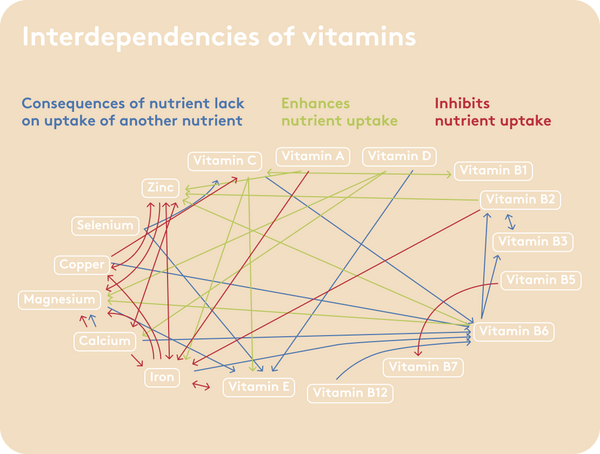Themen dieses Blogartikels:
Introduction
Which supplements are the best for you?
The market for nutritional supplements is incredibly diverse and confusing. It is often difficult to assess which products are right for oneself. The offer ranges from products with a single ingredient to products with 40 active ingredients. It ranges from products for €3 to products for €300. The differences in ingredients, the promises on the package and the price-performance ratio - all these points are relevant when buying dietary supplements.
We want to offer you some clarification when it comes to the topic of complex products or mono supplements and explain how we position ourselves.
We want to offer you some clarification when it comes to the topic of complex products or mono supplements and explain how we position ourselves.
Knowledge for your ears!
No time to read? Here you can listen to Claire's article.
Table of Contents
• What are monopreparations?
• What are complex products?
• Why do we rely on dietary supplements with multiple ingredients?
• What are complex products?
• Why do we rely on dietary supplements with multiple ingredients?
What are monopreparations?
"Mono" means "unique" or "alone". A mono preparation is therefore a dietary supplement that contains a single active ingredient. This is then usually administered in high doses. A typical example are magnesium tablets, melatonin capsules or pure vitamin D. The background of this type of dietary supplement is that one micronutrient in particular is deficient and only this needs to be substituted.

What are complex products?
Complex products, on the other hand, contain - as the name suggests - more than one active ingredient. There is often a certain diversity here. The products aim either to supply all the active ingredients of a group (for example, B vitamins) or to compensate for a deficiency that occurs frequently (for example, due to diet or disease). In the case of dietary supplements with several coordinated active ingredients, the content of the individual ingredients is usually somewhat lower than in the mono-preparation.

Why do we rely on dietary supplements with multiple ingredients?
Complex products have the advantage that interactions between individual micronutrients can be observed. For example, a balance between magnesium and calcium is relevant for normal body functions. Conversely, vitamin C promotes iron and vitamin E absorption. Such interactions are addressed, among other things, in orthomolecular medicine. Pure mono-preparations, with their high dose, could shift the balance and hinder or over-promote the absorption of other micronutrients. The awareness of interactions is still in its infancy, mono preparations are therefore still taken without concern.
Such interactions are addressed, among other things, in orthomolecular medicine. Pure mono-preparations, with their high dose, could shift the balance and hinder or over-promote the absorption of other micronutrients. The awareness of interactions is still in its infancy, mono preparations are therefore still taken without concern.

Another advantage of dietary supplementation with complex products is that often fewer products need to be taken as part of micronutrient therapy. The formulations usually contain a spectrum of necessary micronutrients. Thus, instead of having to take ten active ingredients individually, one or two products containing all of these substances have to be taken. This also saves a lot of space.
30 packages of various ingredients quickly need their own drawer, box or a complete compartment.
Furthermore, micronutrients often do not stand alone in the metabolism. Metabolism is like a network with stops, different directions and passengers.[2] If you look at the metabolism of a cell, this map bears a strong resemblance to a complicated train schedule. Think of it this way.
Let's say each stop represents an enzyme. Passengers,[3] that is, substances, get on, get off, or talk to other passengers, so the substance reacts. In the course of the stops, the passengers change until we arrive at a final stop. Here, the product is ready, there are only the passengers that arrive at the final station. Micronutrients can also be passengers. They could just as easily be parts of the train, without which the train cannot travel. They could also be parts of the stops, i.e. enzymes. A single micronutrient is often not enough to ensure that the train travels the entire distance. There are usually several at each stop.
That's roughly how you can imagine metabolism. Our enzymes need cofactors to function. These are, for example, vitamins or minerals. They help to change the substances enzymatically. If a cofactor in this chain is missing, it can lead to disorders that cannot be clearly diagnosed. For example, a vitamin B12 deficiency can have the same symptoms as a folic acid deficiency. Instead of substituting folic acid in high doses and watching the symptoms get worse, one could also give several B vitamins at the same time and thus include cofactors. With complex products, it is possible to include the cofactors of the targeted reactions in the metabolism and not have to rely on one substance alone.
30 packages of various ingredients quickly need their own drawer, box or a complete compartment.
Furthermore, micronutrients often do not stand alone in the metabolism. Metabolism is like a network with stops, different directions and passengers.[2] If you look at the metabolism of a cell, this map bears a strong resemblance to a complicated train schedule. Think of it this way.
Let's say each stop represents an enzyme. Passengers,[3] that is, substances, get on, get off, or talk to other passengers, so the substance reacts. In the course of the stops, the passengers change until we arrive at a final stop. Here, the product is ready, there are only the passengers that arrive at the final station. Micronutrients can also be passengers. They could just as easily be parts of the train, without which the train cannot travel. They could also be parts of the stops, i.e. enzymes. A single micronutrient is often not enough to ensure that the train travels the entire distance. There are usually several at each stop.
That's roughly how you can imagine metabolism. Our enzymes need cofactors to function. These are, for example, vitamins or minerals. They help to change the substances enzymatically. If a cofactor in this chain is missing, it can lead to disorders that cannot be clearly diagnosed. For example, a vitamin B12 deficiency can have the same symptoms as a folic acid deficiency. Instead of substituting folic acid in high doses and watching the symptoms get worse, one could also give several B vitamins at the same time and thus include cofactors. With complex products, it is possible to include the cofactors of the targeted reactions in the metabolism and not have to rely on one substance alone.
The principle of product complexity is nothing new. Our role model is nature. We try to pack their diversity into our MITOcare products and thus come as close as possible to nature. A healthy diet is important for a reason. It is not without reason that every fruit, vegetable and grain contains more than just one micronutrient. It is not without reason that balance is so important in nature.
For us, the goal is therefore clear: we want to be as complex as nature.
For us, the goal is therefore clear: we want to be as complex as nature.

